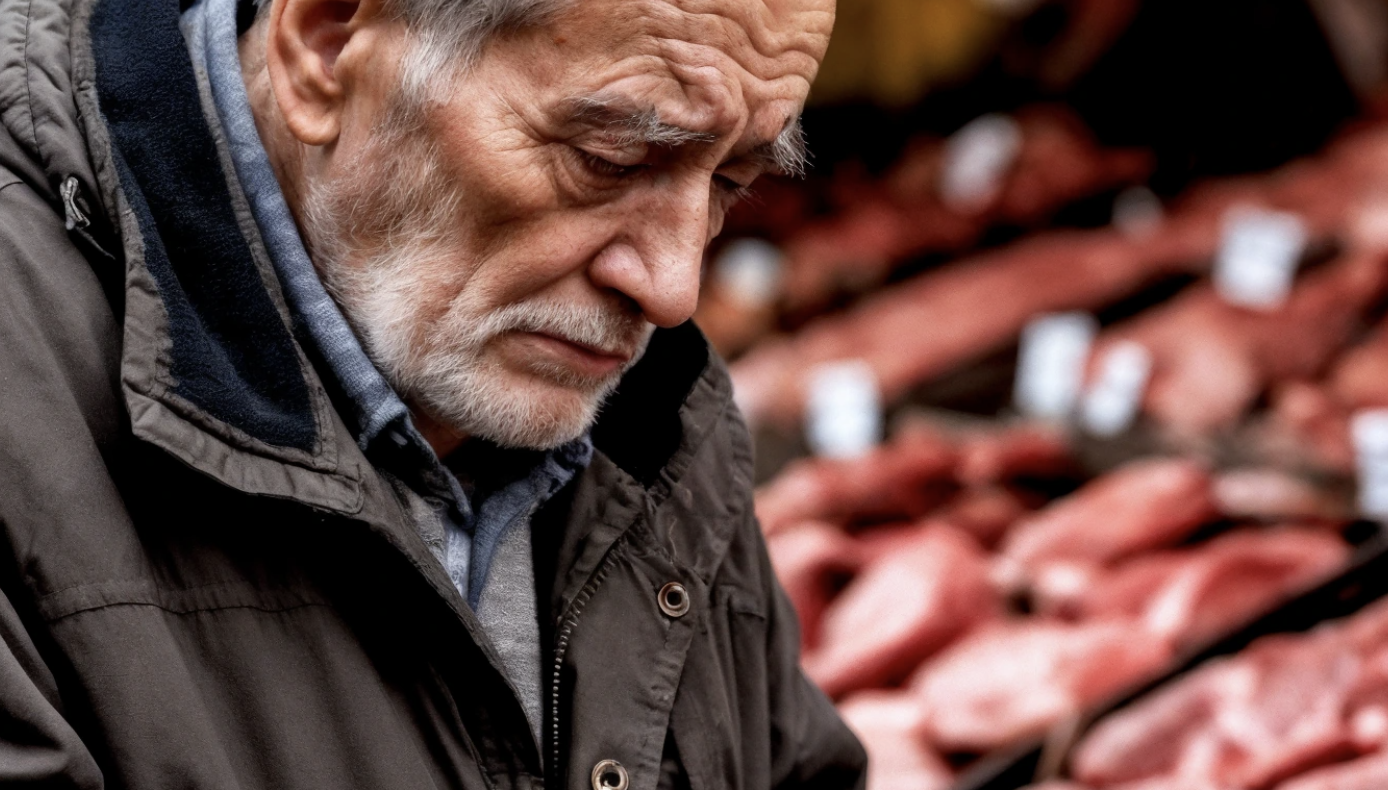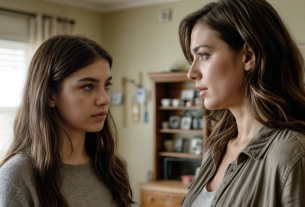The Severny market bustled with life every morning, as if driven by an invisible engine: vendors called out to customers, students haggled over the price of tangerines, loaders cursed under their breath while heaving sacks of potatoes. But on that particular April Thursday, the usual buzz had turned edgy, as if the very air had thickened with unkindness.
A gaunt old man approached the sausage stall. He looked well over eighty—gray military-style coat with patched elbows, shoes laced with mismatched strings. In one hand he held a cane; the other he kept pressed to his chest, as if cradling a pain that hadn’t yet cooled.
The seller—a tall, rosy-cheeked young man named Timur—turned around, knife in hand:
“Move along, grandpa. You’ve got no business here.”
The old man froze, as if he had run into an invisible wall.
“I’d like a small piece of lard, son… I’ll pay.”
“You’ll pay? Where’s your pension, then?” Timur laughed loudly enough for the neighboring stalls to hear. “Tired of freeloaders!”
Shoppers turned. Some smirked, some lowered their eyes.
The old man tried again:
“I’m not begging. I want to buy.”
He pulled out a worn paper wallet. Two ruble coins and an aluminum medal—“For Bravery”—fell out.
Timur snorted.
“Don’t want your coins. See the prices? Go away, you’re in the way.”
The old man looked around. Not a single face showed sympathy. Even the elderly women with bags of herbs averted their eyes. Then he took a deep breath, slowly climbed onto a wooden crate left by the loaders. He stood tall, feet planted wide, as if he were once again at attention.
“Comrades…” His voice was weak but clear. “Allow me to sing a song. Not for charity. For remembrance.”
Timur waved him off.
“Here we go again with the concert! I’ll call security!”
But security guard Petya was busy brewing tea in the booth. People froze—some from curiosity, others from a gnawing discomfort. The old man drew in a breath, pushed past the rasp in his throat, and began to sing that very wartime song:
“Roads… dust and fog…”
The first to pay attention was a boy with a backpack. Then the seed vendor stopped cracking sunflower seeds. The loaders raised their heads. The voice was thin but steady—taut like a string. Each word rang in the hush.
Timur stood still, knife above the sausage. His customer slowly put away her wallet—just stood and listened. The verses flowed on:
“And the steppe’s now overgrown with weeds…”
And suddenly everyone understood—the old man was handing them a thread reaching all the way back to 1945.
Within minutes, the market fell silent. No knives clanged, no scales clicked, even the motion around them stilled. Only the kettle in the guard’s booth let out a whistle—then went quiet as Petya turned it off, not quite knowing why.
The old man finished the final verse, stepped down, and nearly lost his balance. The same boy caught him.
“Please sit down, Grandpa,” he said gently.
A woman in a stylish puffer coat stepped forward from the crowd. She silently handed the old man a bottle of water.
“Here, drink.”
He took a few sips, nodded in thanks. He was about to step off the crate when Timur suddenly moved forward. He grabbed a chunk of lard the size of a brick, wrapped it in paper, and handed it to Fyodor Savelievich.
“Take it. I… didn’t realize right away. Forgive me.”
“No, I must pay,” the old man said stubbornly.
Timur frowned, pulled out money from his pocket, and laid it next to him. Then he added more: a pack of pasta, a head of cheese, a bag of buckwheat.
“This is for you. From all of us.”
It was like the people around woke up from a trance. One by one, they began to offer food: someone gave candies, another a can of beans, someone else—a dozen eggs. Loader Senka tossed in a couple of oranges, the herb vendor—some dill. Bags, bundles, and jars flew into his tote as if the market itself had decided to replenish the lonely veteran’s pantry.
The boy from the front row asked:
“Grandpa, is it far? Need help?”
The old man looked at him with eyes watering from the cold wind.
“I’ll manage. But it’s not for me. It’s for my neighbor—veteran Pavel Artyomovich. His lungs are bad. We lived through it all together, and now… only the two of us remain.”
Timur quickly untied his apron.
“Alright. Petya and I will drive you in the Gazelle. Truck’s free.”
The old man was silent for a long time, as if unsure whether to believe. Then he nodded and quietly said:
“Thank you, kind people. My name is Fyodor Savelievich.”
“I’m Grisha,” the boy smiled. “Grandpa Fyodor, can you teach me that song?”
“I will, grandson. You’ll learn the tune too.”
The crowd parted, forming a living corridor. Grisha walked ahead, holding the medal like a torch. Behind him—Timur and the guard with the heavy bag. People watched them go, as if witnessing a parade.
When the truck pulled away, the market buzzed again. But now the sound carried a different tone—softer, more attentive.
“Maybe we should invite veterans to sing every Thursday?” someone said.
“Let’s do it,” came replies from every side.
Timur returned to his stall, picked up the knife—but his hand trembled. He took off his gloves, closed his eyes, and swiftly wiped something from his face.
A customer in glasses approached:
“What’s the price for cervelat today?”
Timur smiled:
“Discount for those who remember: ninety-eight.”
The market returned to its usual rhythm. But beneath the everyday noise, a new note threaded its way—faint, almost inaudible, yet vital: people remembered how, for just five minutes, everything had stopped—and how the voice of one old man made them hear not price tags, but their own conscience.



